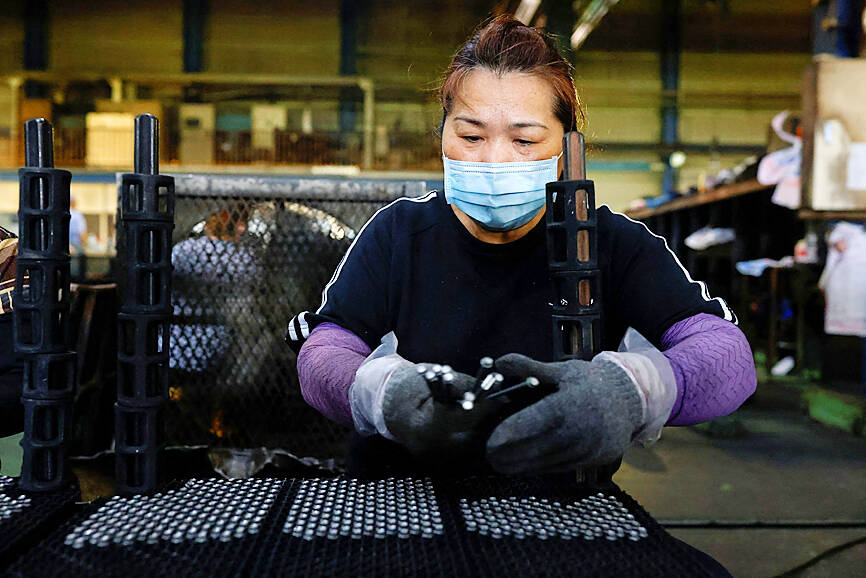The business climate monitor for local manufacturing in February signaled “blue” for a fourth consecutive month, reflecting declines in the petrochemicals, plastic, metal and electronics sectors, while auto components held firm, the Taiwan Institute of Economic Research (TIER, 台灣經濟研究院) said yesterday.
The business composite index edged up 0.85 points to 10.49, stuck in a recessionary state, as selling prices shed another 0.29 points on the back of firms cutting prices to secure orders, while the operating environment, cost, demand and input showed little improvement, the Taipei-based think tank said.
TIER uses a five-color spectrum to capture the industry’s movements, with “red” indicating a boom, “green” suggesting a steady state and “blue” signifying a downturn. Dual colors indicate a transition to a better or worse condition.

Photo: Ann Wang, Reuters
China’s reopening gave local firms a breather, but with end-market demand remaining soft in the US and Europe, inventory adjustments continued, hampering local manufacturers’ willingness to buy and prepare materials used in production, the institute said.
Against this backdrop, the ratio of companies whose business contracted dropped from 73.52 percent in January to 43.34 percent in February, while companies whose business was flat increased from 3.96 percent to 13.1 percent, it said.
Only 1.46 percent of companies reported that business increased and none experienced a boom, it added.
Textile and paper product makers reported a decline in business, as brand customers stuck to cautious inventory management and refrained from placing orders, it said.
Petrochemical suppliers found support in selling prices after local firms reduced capacity by conducting annual maintenance, it said.
Nevertheless, the entry of new competitors and slack global demand translated into a double-digit percentage decline in orders, it said.
Metal product suppliers fared slightly better, but remained weak overall, as downstream customers prioritized digestion of inventories, such as steel, it said.
The conservative business outlook weighed on machinery equipment providers, although some benefited from technology upgrades and capacity expansion by local semiconductor firms, it said.
The business monitor flashed “yellow-blue” for local electronics firms, as servers and networking equipment picked up due to demand from China, the institute said, adding that it did not see a recovery in demand for flat panels, computers and peripheral products.
Makers of transportation tools bucked the downtrend and reported steady business, thanks to the release of new vehicle models and an easing of the chip supply crunch, it said.
As a result, the number of new car license plates spiked 35.18 percent in January to 32,800 in February, it said.

To many, Tatu City on the outskirts of Nairobi looks like a success. The first city entirely built by a private company to be operational in east Africa, with about 25,000 people living and working there, it accounts for about two-thirds of all foreign investment in Kenya. Its low-tax status has attracted more than 100 businesses including Heineken, coffee brand Dormans, and the biggest call-center and cold-chain transport firms in the region. However, to some local politicians, Tatu City has looked more like a target for extortion. A parade of governors have demanded land worth millions of dollars in exchange

Hong Kong authorities ramped up sales of the local dollar as the greenback’s slide threatened the foreign-exchange peg. The Hong Kong Monetary Authority (HKMA) sold a record HK$60.5 billion (US$7.8 billion) of the city’s currency, according to an alert sent on its Bloomberg page yesterday in Asia, after it tested the upper end of its trading band. That added to the HK$56.1 billion of sales versus the greenback since Friday. The rapid intervention signals efforts from the city’s authorities to limit the local currency’s moves within its HK$7.75 to HK$7.85 per US dollar trading band. Heavy sales of the local dollar by

Taiwan Semiconductor Manufacturing Co’s (TSMC, 台積電) revenue jumped 48 percent last month, underscoring how electronics firms scrambled to acquire essential components before global tariffs took effect. The main chipmaker for Apple Inc and Nvidia Corp reported monthly sales of NT$349.6 billion (US$11.6 billion). That compares with the average analysts’ estimate for a 38 percent rise in second-quarter revenue. US President Donald Trump’s trade war is prompting economists to retool GDP forecasts worldwide, casting doubt over the outlook for everything from iPhone demand to computing and datacenter construction. However, TSMC — a barometer for global tech spending given its central role in the

An Indonesian animated movie is smashing regional box office records and could be set for wider success as it prepares to open beyond the Southeast Asian archipelago’s silver screens. Jumbo — a film based on the adventures of main character, Don, a large orphaned Indonesian boy facing bullying at school — last month became the highest-grossing Southeast Asian animated film, raking in more than US$8 million. Released at the end of March to coincide with the Eid holidays after the Islamic fasting month of Ramadan, the movie has hit 8 million ticket sales, the third-highest in Indonesian cinema history, Film